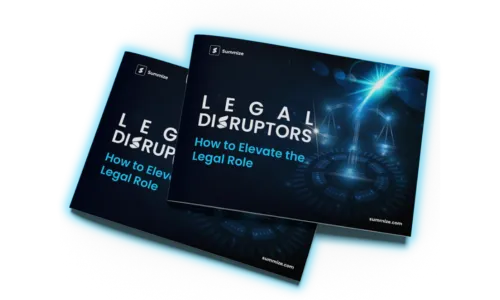Battle tested strategies from an in-house counsel
In this episode of Legal Disrupters, Tom and Bjarne share their valuable insights, tips and findings from their experience working as In-House General Counsels.
June 26, 2022
December 10, 2025
In this episode of our Legal Disruptors podcast, we dive deep into the forces reshaping the legal industry: technology, AI, business transformation, and the rise of data-driven decision-making. With commentary from hosts Graeme Smith, Paris Monroe, and insights from industry leaders, the episode centers on a trendsetter conversation with Bjarne Tellmann, Senior Vice President and General Counsel of Haleon. What emerges is a clear picture of a profession undergoing rapid, structural change.
Gain a snapshot of the episode below and listen to the full insights via the podcast above.
How AI adoption is accelerating
Reports show that around half of lawyers in England and Wales are already using AI in some form. Yet many still underestimate the scale of the change ahead. As Paris Monroe points out, a new wave of sophisticated tools is set to radically transform how legal teams work, operate, and deliver value.
Electra Japonas adds that traditional perceptions inside the profession can hold change back. Many lawyers see their work as uniquely special, work that must be bespoke, manual, and artisanal. But this perspective is being challenged by the rise of automation and smarter digital processes.
Legal tech’s funding boom continues
Despite wider market uncertainty and predictions of recession, investment in legal tech remains strong. New funds are emerging, including one dedicated solely to legal technology, which recently surpassed its fundraising goal with backing from firms like Orrick, DocuSign, Carter, and McDermott. Startups continue to thrive across Europe, with Ukraine alone seeing more than 100 venture-backed legal tech companies since last year.
The next wave of disruptive lawyers
Jennifer Swallow, outgoing head of LawTechUK, predicts that non-lawyers will help drive the next major tipping point in the legal tech market. The rise of structured data, new regulatory sandboxes, online dispute resolution pilots, and better guidance around crypto and smart contracts are all laying the groundwork for a legal system more open to innovation from outside the traditional profession.
In-house lawyers step into the spotlight
Legal departments are increasingly becoming central to major business decisions. According to the Financial Times, in-house teams are now more deeply involved in ESG, strategy, risk management, and data insights than ever before. Rachel John from a major supermarket chain explains that in-house lawyers often sit at the intersection of multiple business units, giving them unique insight that goes far beyond black-and-white legal advice.
Digital tools such as electronic billing and contract lifecycle management (CLM) are also turning legal teams into hubs of valuable company data. This gives them the ability to track risk, spot trends, and identify operational issues long before they escalate.
Bjarne Tellmann on leadership and legal transformation
This episode’s headline interview features Bjarne Tellmann, General Counsel of Haleon. His career path has been anything but conventional, starting as an actor in Norway before joining elite law firms and eventually moving in-house.
Bjarne’s philosophy is shaped by breadth. For him, law firms are finishing schools, excellent for learning precision, professionalism, and attention to detail. But the in-house world offered something different: the chance to work closely with one client, understand strategy deeply, and operate as part of a wider business ecosystem.
Bjarne draws a sharp distinction between the roles of business leaders and lawyers. Business professionals focus on finding the right answers. Lawyers focus on asking the right questions. This mindset, he argues, is essential for navigating risk while still enabling the organization to achieve its goals.
As careers progress, the in-house role shifts from handling legal issues to participating in enterprise-level strategy - shaping decisions, aligning risk appetite, and advising the executive team on high-stakes matters.
Why athletes and lawyers share a mindset
Surprisingly, Bjarne sees strong parallels between competitive athletes and legal professionals. Both tend to be motivated by achievement: setting goals, measuring progress, taking calculated risks, and operating under pressure. However, he notes that lawyers must also overcome certain traits associated with individual sports, particularly the need to prioritize team success over personal performance.
A future full of opportunity
Despite concerns about disruption, both Tom Dunlop and Bjarne close on a positive note. With new roles, new skill sets, and a more diversified legal ecosystem, the future of legal is expanding, not shrinking. There are more ways than ever for professionals to contribute, whether as technologists, operators, analysts, or strategic advisors.
The episode wraps up the current series of Legal Disruptors, promising more conversations on the cutting edge of legal, business, and technology later this year. If you would like to hear from more of our Legal Disruptors, click the button below.
Discover even more!
Explore more about contracting and CLM in our ultimate contract guides








